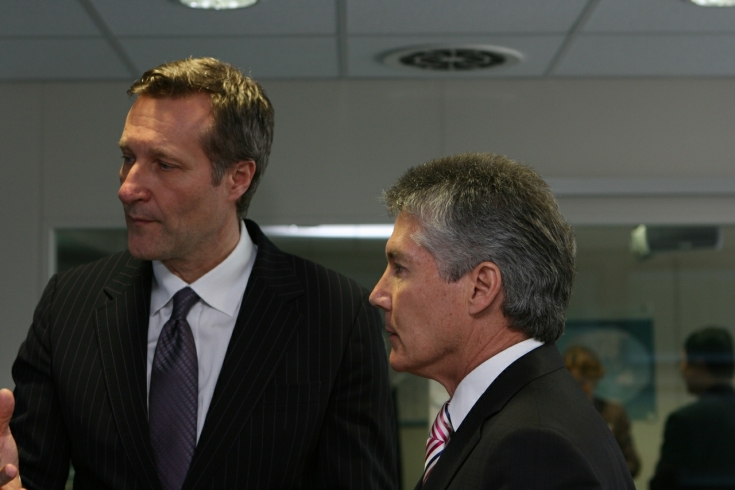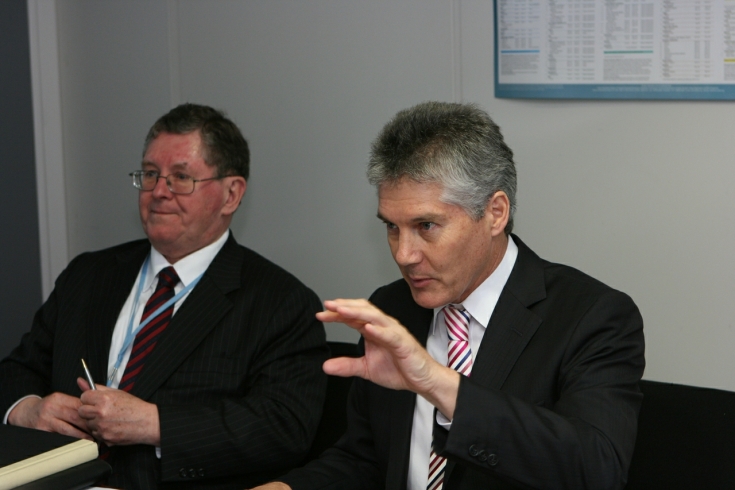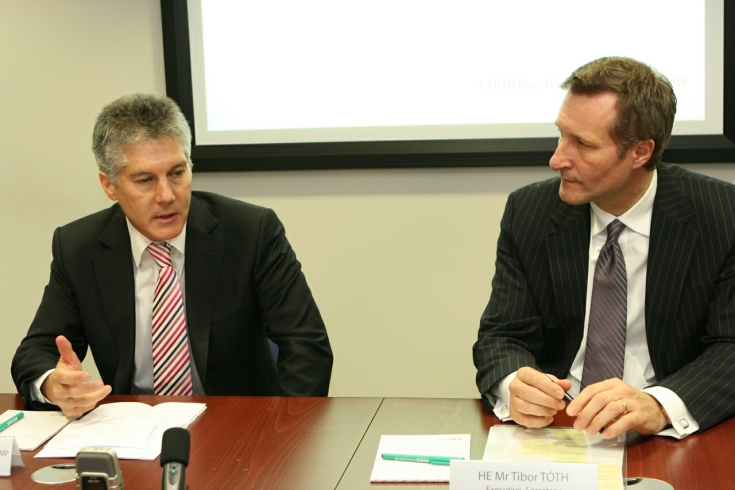Australia and the CTBTO to work together to win support for the Treaty
There’s more Australia can do to win support from countries in the Asia Pacific region for the Comprehensive Nuclear-Test-Ban Treaty (CTBT), Stephen Smith, Australia’s Foreign Minister told a Vienna press conference on 17 February 2010. “One of the conversations that we had is how Australia can persistently encourage other nations in our region and in the Asia Pacific to sign up to the Treaty and to ratify it,” Smith told reporters after a meeting with Tibor Tóth, Executive Secretary of the Preparatory Commission for the Comprehensive Nuclear-Test-Ban Treaty Organization (CTBTO).
Australia’s key role
Tóth told the press conference he considered Australia “a superpower for nuclear disarmament and nuclear nonproliferation.” After the United States and the Russian Federation, Australia is the country hosting the highest number of monitoring facilities in the CTBTO network of 337 seismic, infrasound, hydroacoustic, and radionuclide stations around the world. “It was Australia who took the Treaty from Geneva to New York, played a significant role during the last decade in promoting the Treaty, and helped us in many regions of the world,” said Tóth.

Stephen Smith, Australia’s Foreign Minister, meets Tibor Tóth, CTBTO Executive Secretary, on 17 February 2010 in Vienna.
The CTBT has been ratified by 151 States and signed by 182. “Australia has worked very closely with the CTBTO to help secure those ratifications. There is more we can do,” said Smith. China, the Democratic People’s Republic of Korea, Egypt, India, Indonesia, Iran, Israel, Pakistan and the United States still have to ratify for the Treaty to enter into force. Another 35 States have either not signed (10 States) or not ratified (25 States) the Treaty.
U.S. ratification – a defining moment
“It is not a secret that the U.S. ratification will be a defining ratification and there are complexities around this issue because of the wider complications the U.S. administration is facing,” said Tóth. “In such a situation, are we waiting, sitting on the fence, or sitting on our hands?” he asked. “We had a similar view that whatever we can do, we will do jointly. We will try to see whether beyond the U.S. ratification any other Annex 2 ratifications will be possible and work with different countries. […] There was a strong recognition that any ratification brings us closer to a universally recognized norm,” he said.

“Australia is a superpower for nuclear disarmament and nuclear nonproliferation,” said Tóth.
Additional ratifications would make a difference
Tóth said he wants to see the number of States that have ratified the Treaty increase to 160 in the near future. “We recognized the fact that there is a relationship between the ratification of an Annex 2 country and how neighbouring countries might be moving forward,” said Tóth. “It would make a big difference now,” he added. “We want to send a message to the Annex 2 countries that yes, it is their judgment, but the predominant expectation is loud and clear.”
Indonesia can show leadership for common benefit
“Indonesia, as one of the Annex 2 countries, can make a difference,” Tóth said, answering a journalist’s question. “It is worthwhile for Indonesia, and for all of us, to think through what countries can do individually for a wider benefit. Indonesia can show leadership, in accordance with its best traditions [and] the return would be high for both Indonesia and the wider international community. This is the angle through which both the CTBTO and Australia are viewing the issue, while of course the final judgment will have to stay with Indonesia,” Tóth concluded.

Michael Potts, Australia’s ambassador, and Stephen Smith, Australia’s Foreign Minister.
“We need not just ideas, but people who can implement these ideas,” Tóth said. Around 300 people participate yearly in different training activities with the CTBTO. “We want to move to 1000 and beyond and create the human infrastructure to take advantage of this $1 billion investment,” Tóth said. “The CTBTO would like to make a significant step forward on capacity development, to create additional knowledge, additional layers of people who are skilled in verification and monitoring, who understand the issues behind the technology.”
“Of course we see the CTBT as one of the most fundamental things that the global community can do to reach the ultimate objective of the abolition of nuclear weapons,” concluded Smith.

“We need not just ideas, but people who can implement these ideas,” Tóth said.
24 Feb 2010
